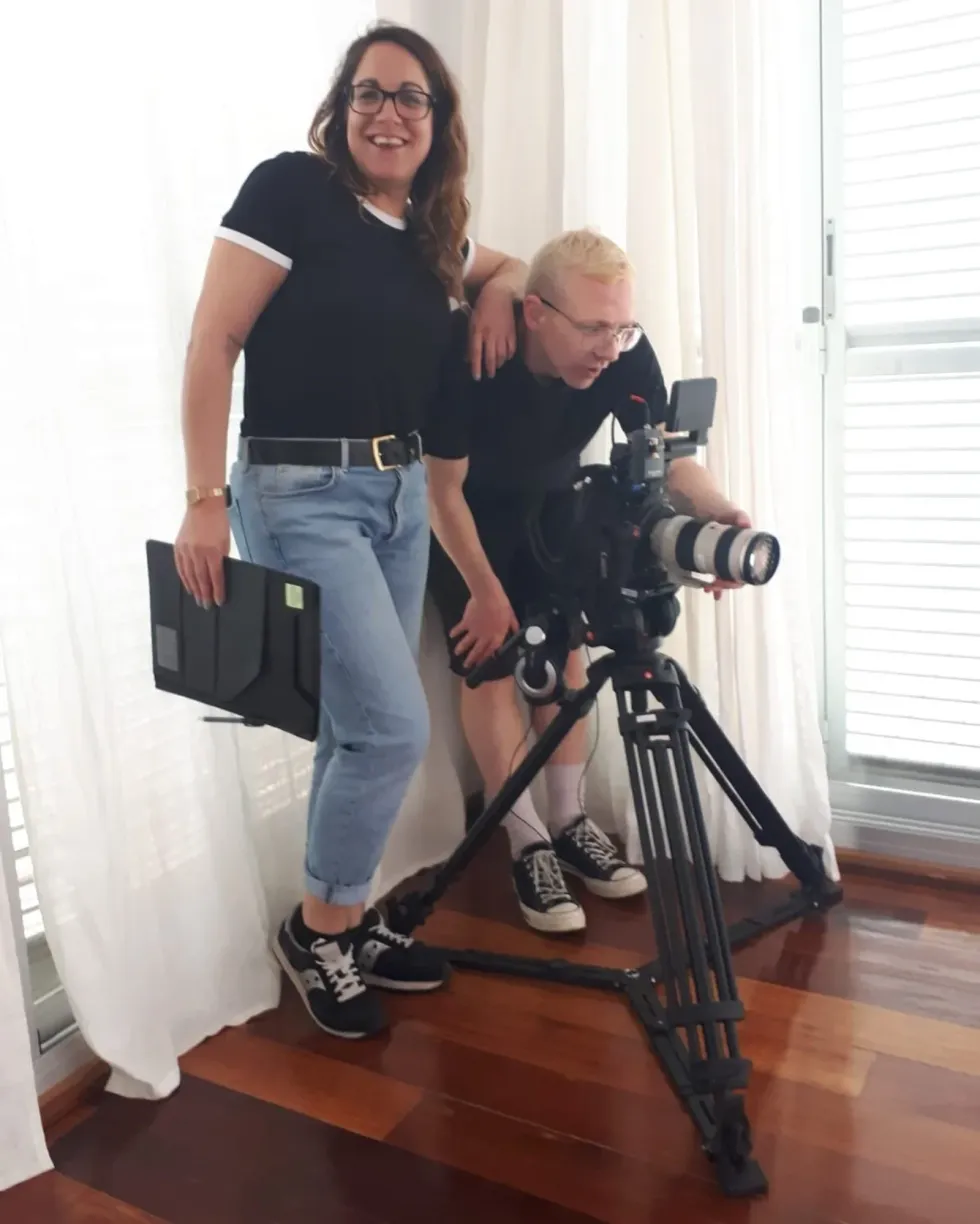While having sex for the first with a new partner can be fun and exciting and it can be easy to lose yourself in the moment, checking in about STI status and discussing precautions you both feel comfortable using is an important step to make sure everyone is on the same page before getting biblical.
At this point, most of us understand how to stop the transmission of HIV — PrEp and condoms are a great defense — but far fewer queer women and people with vaginas understand how to protect themselves against HSV-1 and how to tell their partner if they already have it.
Although the majority of Americans already have HSV-1 (or oral herpes), understanding this STI and learning how to talk to your partner or hookup about it may still feel overwhelming. PRIDE talked to experts Sofie Roos, a bisexual licensed sexologist and relationship therapist, and Dr. Emily May, a certified sex therapist, to find out how to have these tough conversations, why it’s not as big of a deal as you might think, and what you need to know about having safe sex whether or not you or your partner have the viral disease.
What is HSV-1 and how common is it?

PeopleImages.com/Shutterstock
Since HSV-1 can be transmitted via kissing or from mouth-to-genital contact, it is incredibly common. In fact, John Hopkins Medicine reports that between 50 to 80 percent of American adults have HSV-1. So, if you've got it, you aren't alone.
HSV-1 can also be transmitted from someone's genitals to another person's mouth or from genital-to-genital contact. The good news is that if you have it and are symptomatic, not only are there safe sex techniques you can use to protect against the infection, but there are also antivirals you can take to suppress the virus, which helps to prevent transmission to your sexual partners, according to the Center for Disease Control.
But both Roos and May tell PRIDE that not only is the disease very common, but it's also not dangerous to healthy adults. "The virus is not dangerous for adults even though it's very taboo and can cause anxiety, shame and that you don't want to engage sexually with others anymore," Roos says.
"HSV-1 is really common and most people have it so hopefully, this dispels a lot of the scare around it," May explains. "It sometimes manifests as cold sores but it's primarily associated with oral herpes. It makes an appearance downstairs through oral-genital contact. This is often the main concern about herpes but it's not massively life-changing. Mainly just unpleasant."
If you have HSV-1, when is the right time to disclose to your partner? Or how do you ask a new partner about their status?

Inside Creative House/Shutterstock
The best policy with any STI is to bring it up before you get intimate with a new partner, but this is a little trickier with HSV-1 since we normally kiss someone before ever having an STI status convo. But the experts agree that the sooner you bring it up, the better so that you don’t leave the person you want to hook up with feeling like you lied by omission.
“Talking to a new partner about HSV-1 doesn’t have to be a ‘stop the presses’ moment,” May says. “I often tell my clients, that honesty is the best way to address this situation. Ideally, bring it up before things get intimate, not as pillow talk, but in a relaxed, private moment. You could say, ‘Hey, before we go further, I want to share something about my health.’ Keep it matter-of-fact, sprinkle in how common it is, and maybe mention that you’re open to answering any questions.”
Roos says that bringing it up before getting hopping into bed with someone is key even if the conversation doesn’t feel very sexy. “It’s most fair for your partner, and you will have it easier to live with yourself” she says. “I know this can suck, but if they are unsure about you after you’ve told them, you can go and take a blood test together to see if they also carry the virus asymptomatically. If they do already have it (which they statistically do), you can just go on and kiss as there was no tomorrow without needing to worry about transmitting anything, and your partner will know that you’re an honest person.”
How do you kiss safely when one partner has HSV-1?

PeopleImages.com — Yuri A/Shutterstock
When you have HSV-1 — and aren't asymptomatic — you'll have outbreaks that will result in cold sores or lesions. When you're having an outbreak, your safest bet is not to kiss anyone because that is when you are the most likely to transmit the disease. "Kissing with HSV-1 is risky if you have any active sores or developing lesions. My advice is just to avoid it altogether until you have no visible lesions or sensations on the mouth," May explains.
While the risk is relatively low, it is also possible to transmit HSV-1 when you don't have any cold sores, so when you're in a long-term relationship, it may be best to sit down and weigh the pros and cons together. "In a long term relationship, the virus is much [more] likely to transmit at some point, so it's more about accepting the situation together, and even though that can be very difficult, remembering that due to statistics you both most likely already are infected, can help," Roos says. This is also why it's a good idea for both partners to get tested, because if you both already have it then you have nothing to worry about.
How do you have oral sex safely in this situation?

Photographer_ME/Shutterstock
You’re best bet is to avoid oral sex while having an outbreak, but for Sapphics looking to eat or get eaten, the tried and true dental dam is going to be your best line of defense. “Dental dams and condoms aren’t just for high school sex-ed demos, they’re great tools in the intimacy toolkit. I talk about this all the time, safety doesn’t have to be unsexy,” May explains.
How do you engage in tribadism or use your hands during sex safely?

Filadendron/Getty Images
Doing “the knee thing” or rubbing up against a thigh or any other part of the body that isn’t the mouth or genitals is generally pretty safe so long as you thoroughly wash up with soap and warm water afterward — Roos recommends washing up twice just to be safe. You should also do the same if you’re using your hands during sex since we tend to unconsciously touch our faces all the time. It's also best to avoid touching any open sores so that you don’t spread the virus or contract it yourself.
May says that if you want to be really careful, you can wear latex (or latex-free) gloves. “If you want to keep things safe and clean always make sure your hands are washed and fingernails are short,” she explains. Honestly, that's just sound advice for any sexually active queer woman.
How do you use sex toys safely?

Roman Chazov/Shutterstock
Sex toys should always be cleaned and disinfected after use and between partners, meaning that if you use a vibrator on your partner, don't use it on yourself without cleaning it first. Or if it's a strap-on or vibrator, you can use a condom and switch it out for a new one in between partners.
Roos warns that using a strap-on has a slightly higher risk because you're genitals are likely to touch during sex, but if you avoid doing it when you or your partner are having an outbreak and use all of the other safe sex techniques, you'll lower your risk.
But May explains that it's also important to remember that you can still have a fun and fulfilling sex life with this viral infection. "Managing HSV-1 doesn't mean the fun stops," she says. "You just have to get better at communicating with your partner. Plus, being proactive and open often strengthens intimacy."
Roos seconds this, "My final words are that you shouldn't be ashamed of having HSV-1 and that it definitely shouldn't stop yourself from having a great, fun and enjoyable sex life!"
Experts Cited:
Sofie Roos, a bisexual licensed sexologist and relationship therapist who writes for Passionerad.
Emily May, a certified sex therapist who works for Private Sugar Club.


























































 Adult stars Tony Genius, Jordan Starr, and Dom King.Mile High Entertainment / Carlos Salazar / Men.com
Adult stars Tony Genius, Jordan Starr, and Dom King.Mile High Entertainment / Carlos Salazar / Men.com











